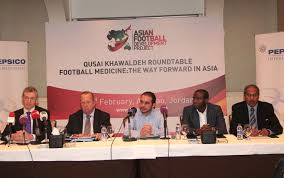By Andrew Warshaw in Amman
February 22 – Asian football today agreed on a raft of measures for tackling cardiac arrest following the death last November of under-22 Jordanian footballer Qusai Khawaldeh whose tragic loss sent shockwaves throughout the region.
Specialist doctors and consultant cardiologists, including members of the team that miraculously saved former Bolton Wanderers midfielder Fabrice Muamba two years ago during a cup game at Tottenham, convened in the Jordanian capital for a detailed exchange of views aimed at improving facilities and knowledge, not just in Jordan but across the Asian Continent.
Muamba, whose heart stopped for 78 minutes and who was ultimately forced to retire from the game, was himself one of the speakers, paying tribute to those who treated him and recalling how his life had changed.
In-depth presentations were provided by a number of international experts including FIFA medical chief Michel D’Hooghe; head of Asian football’s medical committee Dato’ Dr. Gurcharan Singh; and members of Muamba’s medical team, many of whom he had not seen for several months.
Organised by the non-profit making Asian Football Development project and chaired by its founder, FIFA vice-president and Jordanian FA chief Prince Ali bin al Hussein, the round-table panel provided several worrying statistics, not least how, on average, footballers were dying of cardiac failure at the rate of one a month.
Dr Singh provided damning evidence of the lack of acceptable facilities in many of his Continent’s member nations and called for properly trained doctors to give victims of cardiac arrest a better chance of survival.
D’Hooghe called for more sophisticated screening methods and greater access to the kind of defebrilator that helped save Muamba. “There are no guarantees but we can save more lives with greater preventative measures,” the Belgian said.
Muamba said the conference was essential to raise awareness about heart issues. “It’s been a great discussion with a very important message to pass on to all players and stakeholders in football,” he said. “Proper medical tests and the development of healthcare in football can and does prevent injuries and save lives.”
Among the recommendations was a call for every FIFA member nation to have a properly established medical department; minimum qualifications for medical personnel; engage medical partners such as pharmaceutical companies to ease the financial burden on buying fresh equipment; effective screening procedures at all levels; access to medical records for players, referees, and coaches; and improved access to defibrillators.
Concluding the day-long session, Prince Ali told delegates: “We believe these recommendations will provide Asian associations and clubs with the direction they need to develop guidelines that will hopefully contribute towards lowering the number of deaths and injuries on the football pitch. The well-being of our players is and will always be our number one priority.”
Contact the writer of this story at moc.l1745291631labto1745291631ofdlr1745291631owedi1745291631sni@w1745291631ahsra1745291631w.wer1745291631dna1745291631


